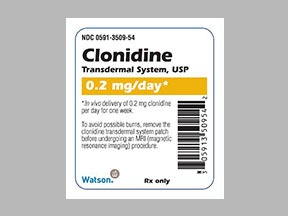
Catapres-tts-2 Coupons & Savings Card – Discount Prices from $33.55
Brand for: Clonidine
Clonidine is a prescription medication used to manage high blood pressure, either by itself or combined with other drugs. It belongs to the central alpha agonists class and functions by targeting the brain to reduce the activity of stress hormones, such as norepinephrine. This action results in a slower heart rate and relaxed blood vessels, facilitating easier blood flow and lowering blood pressure. While effective, clonidine is not typically the first choice for treating high blood pressure due to the potential for "rebound hypertension" if the medication is discontinued abruptly. Additionally, it may not be suitable for older adults as it can increase the risk of falls. Clonidine is available in different forms, including a topical patch, an immediate-release tablet, and an extended-release tablet. Always consult with a healthcare provider before starting or stopping clonidine to ensure it is safe and appropriate for your individual health needs.
Our Catapres-tts-2 coupons are free to use. You can print the coupon, email it to yourself, or receive the Catapres-tts-2 coupon via text message. To get your free discount, show the pharmacist your Catapres-tts-2 savings card which has the discounted coupon price. Use our filters below to edit the prescription box to match your needs. The Catapres-tts-2 prices will update based on your prescription needs. Above our Catapres-tts-2 coupons, you can change the location to see pharmacy prices in other areas. Our prescription discount card will update online with the specific pharmacy costs associated with your edits. Be sure to text, email, or print the Catapres-tts-2 savings card code that you need after editing the prescription box and location field. Show the discount card to your pharmacist before paying.
My prescription
Edit
0.2MG/24HR, Clonidine (4 Patch Weeklies)
Select pharmacy

CVS
$33.55
COUPON PRICE
Walgreens
$44.68
COUPON PRICE
Albertsons
$52.76
COUPON PRICE
Walmart
$57.28
COUPON PRICECatapres-tts-2 savings card
Show this card to your pharmacist
CVS
$33.55
BIN
ID
PCN
GRP
019876
LHF6DB4E4A
CHIPPO
LHX
Powered by
Clonidine is a prescription medication used to manage high blood pressure, either by itself or combined with other drugs. It belongs to the central alpha agonists class and functions by targeting the brain to reduce the activity of stress hormones, such as norepinephrine. This action results in a slower heart rate and relaxed blood vessels, facilitating easier blood flow and lowering blood pressure. While effective, clonidine is not typically the first choice for treating high blood pressure due to the potential for "rebound hypertension" if the medication is discontinued abruptly. Additionally, it may not be suitable for older adults as it can increase the risk of falls. Clonidine is available in different forms, including a topical patch, an immediate-release tablet, and an extended-release tablet. Always consult with a healthcare provider before starting or stopping clonidine to ensure it is safe and appropriate for your individual health needs.
Our Catapres-tts-2 coupons are free to use. You can print the coupon, email it to yourself, or receive the Catapres-tts-2 coupon via text message. To get your free discount, show the pharmacist your Catapres-tts-2 savings card which has the discounted coupon price. Use our filters below to edit the prescription box to match your needs. The Catapres-tts-2 prices will update based on your prescription needs. Above our Catapres-tts-2 coupons, you can change the location to see pharmacy prices in other areas. Our prescription discount card will update online with the specific pharmacy costs associated with your edits. Be sure to text, email, or print the Catapres-tts-2 savings card code that you need after editing the prescription box and location field. Show the discount card to your pharmacist before paying.
More prescriptions for hypertension
coupons from$39.26Save 91%
coupons from$17.71Save 92%
coupons from$7.02Save 91%
coupons from$18.60Save 74%
coupons from$66.15Save 38%
coupons from$15.56Save 75%
coupons from$22.48Save 75%
coupons from$54.77Save 48%
More prescriptions for hypertension
Corgard Save 91%coupons from $39.26
Nifedipine ER Save 92%coupons from $17.71
Quinapril Save 91%coupons from $7.02
Spironolactone Save 74%coupons from $18.60
Acebutolol Save 38%coupons from $66.15
Benazepril Save 75%coupons from $15.56
Enalapril-hydrochlorothiazide Save 75%coupons from $22.48
Amiloride-hydrochlorothiazide Save 48%coupons from $54.77
Catapres-tts-2 (Clonidine) dosage forms
Use our Catapres-tts-2 (Clonidine) 0.2MG/24HR coupon with prices from $33.55 for 4 Patch Weeklies. You can also use our Catapres-tts-2 (Clonidine) 0.2MG/24HR coupon with prices from $17.92 for 1 Patch Weekly.
Dosage Quantity Price from Per unit 0.2MG/24HR 4 Patch Weeklies $33.55 $8.39 0.2MG/24HR 1 Patch Weekly $17.92 $17.92
| Dosage | Quantity | Price from | Per unit |
|---|---|---|---|
| 0.2MG/24HR | 4 Patch Weeklies | $33.55 | $8.39 |
| 0.2MG/24HR | 1 Patch Weekly | $17.92 | $17.92 |
Catapres-tts-2 FAQs
What is the difference between clonidine and Catapres?
Clonidine is the generic name of the medication, while Catapres is a brand name for clonidine. Both refer to the same drug, which is used to treat conditions such as high blood pressure. The difference lies in the name and possibly the manufacturer, but the active ingredient is the same.
Using the SaveHealth discount card, what is the price of Catapres-tts-2 without insurance?
Using the SaveHealth discount card, the price of Catapres-tts-2 without insurance is $33.55.
What is the price of Catapres-tts-2 at CVS?
The price of Catapres-tts-2 at CVS is $33.55.
What is the price of Catapres-tts-2 at Walgreens?
The price of Catapres-tts-2 at Walgreens is $44.68.
What is the price of Catapres-tts-2 at Walmart?
The price of Catapres-tts-2 at Walmart is $57.28.
